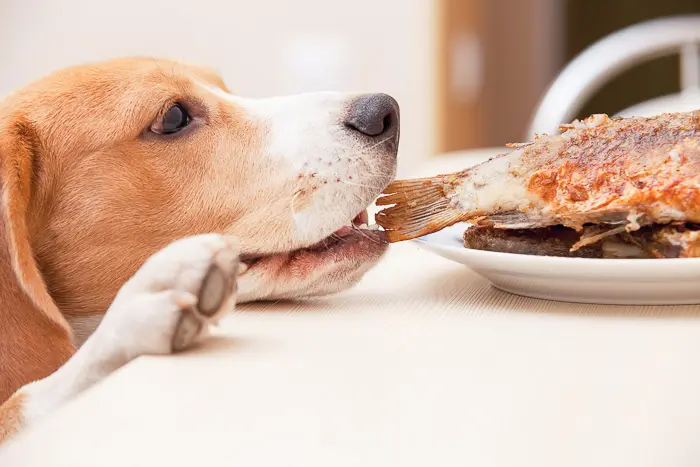Introduction:
Welcome to a fascinating exploration of our furry friends’ dietary preferences. Dogs, our loyal companions, have an undeniable love for meat that goes beyond their teeth and into their very nature. This blog post will uncover the real reasons behind dogs’ affinity for meat, diving into evolutionary, nutritional, and taste-related factors. Join us on this journey as we unravel the mysteries of the canine palate.
The Health Impact of Meat on Dogs
Regarding the health of dogs, meat plays a critical role. As natural carnivores, dogs rely on the high protein content found in meat to support several vital bodily functions. Proteins are the building blocks of body tissues, such as muscles, skin, and hair. They also contribute to a robust immune system, enabling dogs to avoid diseases.
Furthermore, meat supplies abundant essential nutrients that dogs can’t produce alone. These include various vitamins like Vitamin B complex, which aids in energy production and cell health, and minerals like iron and zinc, crucial for oxygen transportation and wound healing, respectively.
However, while meat is essential, ensuring it’s served in moderation is important. An excessive meat intake can lead to obesity and related health problems in dogs due to high fat content—similarly, the quality of meat matters. Unprocessed, lean meats are healthier than processed meats, which often contain additives and high sodium levels.
In conclusion, meat benefits dogs’ health, provided it is balanced with other food groups, served appropriately, and of good quality. Always consult a vet to establish a diet plan suitable for your dog’s age, breed, and health condition.
Evolutionary Reasons:
To understand why dogs have a natural penchant for meat, we must harken back to their ancestral roots. Dogs, descendants of wolves, are carnivores by heritage. Millennials of evolution have shaped their dietary preferences, fine-tuning their senses to thrive on a meat-based diet. The need to hunt and consume prey played a pivotal role in their survival and continues to influence their food choices.
Nutritional Needs:
Meat serves as a vital source of nutrients for our canine companions. Proteins in meat provide essential amino acids for muscle development, tissue repair, and overall growth. Additionally, meat is a rich source of vitamins, minerals, and fatty acids that facilitate optimal health. In their most bioavailable form, these nutrients contribute to dogs’ overall well-being and vitality.
Taste Preference:
Ever wonder why your furry friend enthusiastically devours their meat-based meals? Dogs possess a highly developed sense of taste, and their taste receptors differ from those of humans. Their taste buds are more attuned to the savoury flavours of meat, making it an irresistible choice. This preference for meat-driven tastes can be attributed to their evolutionary history and the unique composition of their taste buds.
Alternative Diets for Dogs:
While meat plays a central role in a dog’s nutrition, some dogs may benefit from alternative diets due to health concerns, dietary restrictions, or ethical considerations. Here are a few alternatives:
Vegetarian and Vegan Diets:
While dogs are traditionally carnivorous, they can adapt to a vegetarian or vegan diet under careful supervision. However, it’s essential to remember that dogs have specific dietary needs that must be met. For instance, they require certain amino acids and vitamins primarily found in meat. Suppose you are considering a vegetarian or vegan diet for your dog. In that case, it’s crucial to consult a vet or a pet nutritionist to ensure all nutritional requirements are adequately met.
Raw Food Diets:
Raw food diets, known as BARF (Biologically Appropriate Raw Food), involve feeding dogs raw meat, vegetables, fruits, and bones. Proponents of this diet argue that it’s more aligned with dogs’ ancestral diet and thus more natural. However, raw diets can pose health risks due to the potential presence of harmful bacteria in raw meat. Therefore, if considering this diet, handling and preparing the food correctly is essential to minimize risk.
Grain-Free Diets:
Grain-free diets eliminate grains and substitute them with other sources of carbohydrates like potatoes or peas. Some dog owners choose this diet due to their dogs’ allergies or sensitivities to grains. It’s important to note that a grain-free diet is only inherently healthier if your dog is specifically allergic to grains.
In conclusion, while several alternative diets are available for dogs, each has pros and cons. Remembering that what works for one dog might not work for another is vital. Always consult a professional before making significant changes to your dog’s diet.
Comparison with Other Animals:
While dogs are often considered omnivorous, their preference for meat sets them apart from other animals with similar dietary classifications. Dogs exhibit physiological and behavioural characteristics that align closely with their carnivorous ancestors. Their dentition, short digestive tract, and specific enzyme profiles support their inclination toward a meat-based diet.
Case Study: “No Vampires Here: The Real Reasons Dogs Love Meat”
In our journey to uncover the reasons behind dogs’ love for meat, we encountered countless anecdotes and case studies that validate our findings. From the Siberian Husky’s voracious appetite to the Boxer breed’s meat-seeking prowess, individual dogs consistently exhibit a natural desire for meat-based sustenance. These real-life examples offer compelling evidence of the innate meat preference ingrained in dogs.
“Skinwalker Dogs, steeped in myth and folklore, are said to possess an uncanny affinity for hunting and a diet that leans heavily towards meat. Their behaviors and dietary preferences echo the meat-loving characteristics of our domesticated dogs, hinting at a timeless connection between myth, nature, and the creatures we share our homes with.”
Conclusion:
As we conclude this exploration of dogs’ affinity for meat, we must acknowledge the significance of understanding individual dietary needs. While dogs share a common ancestry and a love for meat, remember that each dog is unique. Age, breed, health conditions, and personal preferences should be considered when determining the ideal diet for your four-legged companion. You can ensure optimal well-being and happiness by providing a balanced and nutritious diet tailored to their specific needs.
So, the next time you witness your beloved canine companion indulging in their meaty feast, know that it is more than just a preference—it’s a part of their genetic makeup. Embrace their carnivorous heritage and nourish them with the nutrients they need to thrive. Because in this world, there are no vampires, just dogs with an insatiable love for meat.







